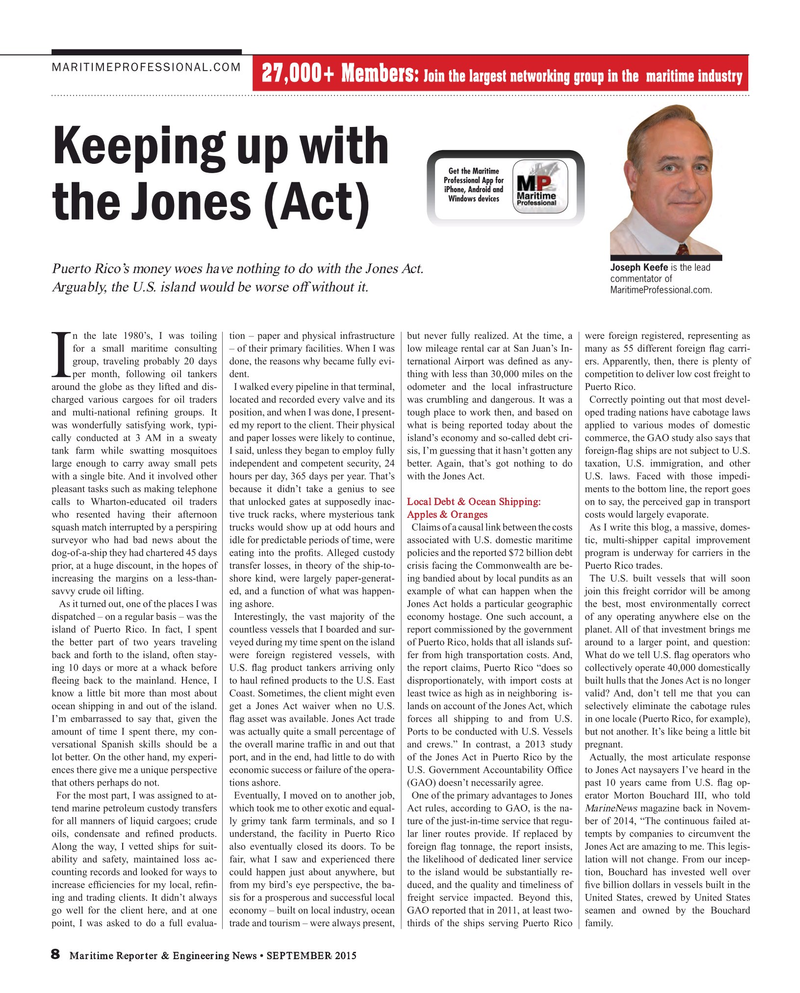
Page 8: of Maritime Reporter Magazine (September 2015)
Offshore Energy Technologies
Read this page in Pdf, Flash or Html5 edition of September 2015 Maritime Reporter Magazine
MARITIMEPROFESSIONAL.COM 27,000+ Members: Join the largest networking group in the maritime industry
Keeping up with
Get the Maritime
Professional App for iPhone, Android and
Windows devices the Jones (Act)
Joseph Keefe is the lead
Puerto Rico’s money woes have nothing to do with the Jones Act. commentator of
Arguably, the U.S. island would be worse off without it.
MaritimeProfessional.com.
n the late 1980’s, I was toiling tion – paper and physical infrastructure but never fully realized. At the time, a were foreign registered, representing as for a small maritime consulting – of their primary facilities. When I was low mileage rental car at San Juan’s In- many as 55 different foreign ? ag carri- group, traveling probably 20 days done, the reasons why became fully evi- ternational Airport was de? ned as any- ers. Apparently, then, there is plenty of
Iper month, following oil tankers dent. thing with less than 30,000 miles on the competition to deliver low cost freight to around the globe as they lifted and dis- I walked every pipeline in that terminal, odometer and the local infrastructure Puerto Rico.
charged various cargoes for oil traders located and recorded every valve and its was crumbling and dangerous. It was a Correctly pointing out that most devel- and multi-national re? ning groups. It position, and when I was done, I present- tough place to work then, and based on oped trading nations have cabotage laws was wonderfully satisfying work, typi- ed my report to the client. Their physical what is being reported today about the applied to various modes of domestic cally conducted at 3 AM in a sweaty and paper losses were likely to continue, island’s economy and so-called debt cri- commerce, the GAO study also says that tank farm while swatting mosquitoes I said, unless they began to employ fully sis, I’m guessing that it hasn’t gotten any foreign-? ag ships are not subject to U.S. large enough to carry away small pets independent and competent security, 24 better. Again, that’s got nothing to do taxation, U.S. immigration, and other with a single bite. And it involved other hours per day, 365 days per year. That’s with the Jones Act. U.S. laws. Faced with those impedi- pleasant tasks such as making telephone because it didn’t take a genius to see ments to the bottom line, the report goes calls to Wharton-educated oil traders that unlocked gates at supposedly inac- Local Debt & Ocean Shipping: on to say, the perceived gap in transport who resented having their afternoon tive truck racks, where mysterious tank Apples & Oranges costs would largely evaporate.
squash match interrupted by a perspiring trucks would show up at odd hours and Claims of a causal link between the costs As I write this blog, a massive, domes- surveyor who had bad news about the idle for predictable periods of time, were associated with U.S. domestic maritime tic, multi-shipper capital improvement dog-of-a-ship they had chartered 45 days eating into the pro? ts. Alleged custody policies and the reported $72 billion debt program is underway for carriers in the prior, at a huge discount, in the hopes of transfer losses, in theory of the ship-to- crisis facing the Commonwealth are be- Puerto Rico trades. increasing the margins on a less-than- shore kind, were largely paper-generat- ing bandied about by local pundits as an The U.S. built vessels that will soon savvy crude oil lifting. ed, and a function of what was happen- example of what can happen when the join this freight corridor will be among
As it turned out, one of the places I was ing ashore. Jones Act holds a particular geographic the best, most environmentally correct dispatched – on a regular basis – was the Interestingly, the vast majority of the economy hostage. One such account, a of any operating anywhere else on the island of Puerto Rico. In fact, I spent countless vessels that I boarded and sur- report commissioned by the government planet. All of that investment brings me the better part of two years traveling veyed during my time spent on the island of Puerto Rico, holds that all islands suf- around to a larger point, and question: back and forth to the island, often stay- were foreign registered vessels, with fer from high transportation costs. And, What do we tell U.S. ? ag operators who ing 10 days or more at a whack before U.S. ? ag product tankers arriving only the report claims, Puerto Rico “does so collectively operate 40,000 domestically ? eeing back to the mainland. Hence, I to haul re? ned products to the U.S. East disproportionately, with import costs at built hulls that the Jones Act is no longer know a little bit more than most about Coast. Sometimes, the client might even least twice as high as in neighboring is- valid? And, don’t tell me that you can ocean shipping in and out of the island. get a Jones Act waiver when no U.S. lands on account of the Jones Act, which selectively eliminate the cabotage rules
I’m embarrassed to say that, given the ? ag asset was available. Jones Act trade forces all shipping to and from U.S. in one locale (Puerto Rico, for example), amount of time I spent there, my con- was actually quite a small percentage of Ports to be conducted with U.S. Vessels but not another. It’s like being a little bit versational Spanish skills should be a the overall marine traf? c in and out that and crews.” In contrast, a 2013 study pregnant.
lot better. On the other hand, my experi- port, and in the end, had little to do with of the Jones Act in Puerto Rico by the Actually, the most articulate response ences there give me a unique perspective economic success or failure of the opera- U.S. Government Accountability Of? ce to Jones Act naysayers I’ve heard in the that others perhaps do not. tions ashore. (GAO) doesn’t necessarily agree. past 10 years came from U.S. ? ag op-
For the most part, I was assigned to at- Eventually, I moved on to another job, One of the primary advantages to Jones erator Morton Bouchard III, who told tend marine petroleum custody transfers which took me to other exotic and equal- Act rules, according to GAO, is the na- MarineNews magazine back in Novem- for all manners of liquid cargoes; crude ly grimy tank farm terminals, and so I ture of the just-in-time service that regu- ber of 2014, “The continuous failed at- oils, condensate and re? ned products. understand, the facility in Puerto Rico lar liner routes provide. If replaced by tempts by companies to circumvent the
Along the way, I vetted ships for suit- also eventually closed its doors. To be foreign ? ag tonnage, the report insists, Jones Act are amazing to me. This legis- ability and safety, maintained loss ac- fair, what I saw and experienced there the likelihood of dedicated liner service lation will not change. From our incep- counting records and looked for ways to could happen just about anywhere, but to the island would be substantially re- tion, Bouchard has invested well over increase ef? ciencies for my local, re? n- from my bird’s eye perspective, the ba- duced, and the quality and timeliness of ? ve billion dollars in vessels built in the ing and trading clients. It didn’t always sis for a prosperous and successful local freight service impacted. Beyond this, United States, crewed by United States go well for the client here, and at one economy – built on local industry, ocean GAO reported that in 2011, at least two- seamen and owned by the Bouchard point, I was asked to do a full evalua- trade and tourism – were always present, thirds of the ships serving Puerto Rico family. 8 Maritime Reporter & Engineering News • SEPTEMBER 2015
MR #9 (1-9).indd 8 MR #9 (1-9).indd 8 9/4/2015 11:26:44 AM9/4/2015 11:26:44 AM

 7
7

 9
9
